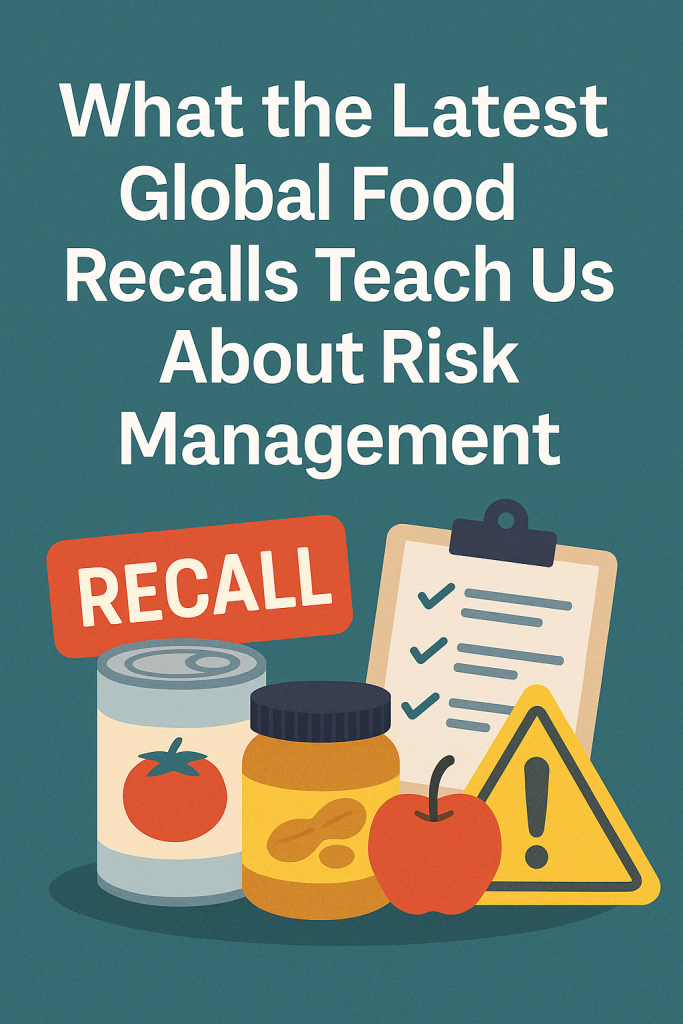
Food recalls are no longer rare events—they are becoming a regular part of the global food supply landscape. From undeclared allergens and contamination to mislabeling and foreign objects, recent food recall cases have made one thing very clear: robust food safety risk management is no longer optional—it’s essential.
In this post, we break down major global food recalls in 2024–2025 and highlight what food businesses can learn to proactively manage risks and avoid devastating consequences.
📉 The Impact of Food Recalls on Businesses
Whether you’re a local food manufacturer or an international exporter, a food recall can:
-
Damage your brand reputation
-
Lead to regulatory fines
-
Disrupt your supply chain
-
Cause financial loss
-
Result in consumer health risks
For example, a major multinational chocolate company faced a global recall in early 2025 due to salmonella contamination. The result? A 15% dip in quarterly revenue and a massive trust deficit among customers.
🧪 Recent Food Recalls That Made Headlines
Here are a few notable recalls from the last 12 months:
-
Salmonella in Peanut Butter (USA) – Contaminated raw materials led to a multi-state recall affecting schools and retail chains.
-
Listeria in Frozen Vegetables (Europe) – Inadequate cold-chain monitoring caused a continent-wide alert.
-
Undeclared Allergen in Protein Bars (Australia) – Mislabeling led to multiple hospitalizations.
-
Foreign Metal Objects in Canned Goods (Asia) – Equipment failure and poor maintenance were to blame.
Each of these cases highlights a different weakness—whether in supply chain oversight, allergen management, labeling control, or equipment safety.
🔍 Top 6 Risk Management Lessons from Recent Recalls
1. Know Your Supply Chain Inside-Out
Many recalls begin with an issue from a third-party supplier. Implement a supplier approval program, conduct audits, and insist on transparent documentation.
2. Strengthen Allergen Control
Most allergen-related recalls are avoidable. Establish robust labeling checks, conduct regular allergen testing, and train staff on cross-contamination risks.
3. Implement Real-Time Monitoring Systems
Temperature abuse and contamination risks can be minimized with IoT-enabled sensors and automated alerts—especially critical for cold chain integrity.
4. Conduct Regular Internal Audits
Routine checks help identify potential gaps before they become problems. Ensure your GMP, HACCP, and FSMS procedures are followed to the letter.
5. Build a Rapid Recall Response Plan
When things go wrong, time is of the essence. Have a documented recall plan and a crisis communication strategy in place. Test it annually.
6. Train Employees Continuously
Employees are the first line of defense. Ongoing food safety training, especially on personal hygiene and SOPs, can drastically reduce error-based risks.
📊 Proactive vs. Reactive: What’s Your Risk Approach?
The best food safety programs are proactive, not reactive. If your team only takes action when a recall happens elsewhere, your system is already behind.
Invest in preventive controls, not just corrective actions.
🌍 Global Standards and Certification: A Key Defense
Certifications like BRCGS, ISO 22000, or FSSC 22000 provide a structured approach to food safety. These standards help businesses implement comprehensive risk-based thinking, which is critical for international trade.
🚀 Final Thoughts: Turn Recalls into Lessons
The wave of recent global food recalls serves as a stark reminder—food safety risk management is not just about compliance, it’s about protecting lives and livelihoods.
Food businesses that stay ahead of risks with strong systems, training, and culture will thrive—even in times of crisis.
🛡️ Is Your Food Business Recall-Ready?
If you’re unsure whether your business is truly prepared, it might be time to audit your current systems. Don’t wait for a recall to be your wake-up call. Be proactive, not reactive.
